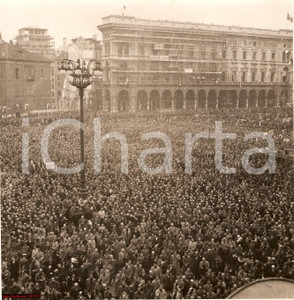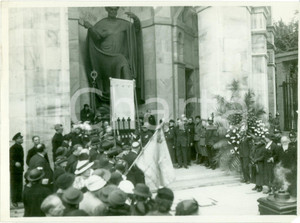
1935 Milano Piazza Duomo - Lettura bollettino di guerra - Foto (2)
FOTOGRAFIE
Fotografie storiche (1860-1970)
Reportage
€38,00
(Risparmi
)
Milano, Piazza Duomo
Vera fotografia d'epoca raffigurante la folla riunita in Piazza del Duomo per ascoltare la lettura del bollettino di guerra in occasione della celebrazione dell'annuale della Vittoria. E' probabile che quell'occasione servi' anche ad annunciare le "inique" sanzioni decise dalla Società delle Nazioni a seguito dell'invasione italiana dell'Etiopia.
Nel giugno di quell'anno, infatti, l'Etiopia aveva chiesto alla Società delle Nazioni di inviare osservatori neutrali alle sue frontiere, temendo un'invasione italiana.
Successivamente, all'inizio di novembre, l'Assemblea della Società delle Nazioni Unite decise di applicare sanzioni economiche e finanziarie nei confronti dell'Italia, come stato aggressore. In Italia venne quindi avviata una politica di autarchia, assieme ad una massiccia campagna propagandistica volta a denunciare i disagi causati dalle "inique sanzioni".
Foto Keystone - Milano
In mediocri condizioni (mancanza al margine inferiore sinistro).
Vera fotografia d'epoca, originale e autentica, completa di nota dattiloscritta e timbro datario al verso.
---------------------------
Note: The League of Nations (LON) was an intergovernmental organization founded as a result of the Paris Peace Conference, and the precursor to the United Nations. At its greatest extent from 28 September 1934 to 23 February 1935, it had 58 members. The League's primary goals, as stated in its Covenant, included preventing war through collective security, disarmament, and settling international disputes through negotiation and arbitration. Other goals in this and related treaties included labour conditions, just treatment of native inhabitants, trafficking in persons and drugs, arms trade, global health, prisoners of war, and protection of minorities in Europe.
The diplomatic philosophy behind the League represented a fundamental shift in thought from the preceding hundred years. The League lacked its own armed force and so depended on the Great Powers to enforce its resolutions, keep to economic sanctions which the League ordered, or provide an army, when needed, for the League to use. However, they were often reluctant to do so.
Sanctions could also hurt the League members, so they were reluctant to comply with them. When, during the Second Italo-Abyssinian War, the League accused Italian soldiers of targeting Red Cross medical tents, Benito Mussolini responded that "the League is very well when sparrows shout, but no good at all when eagles fall out."
After a number of notable successes and some early failures in the 1920s, the League ultimately proved incapable of preventing aggression by the Axis powers in the 1930s. In May 1933, Franz Bernheim, a Jew, complained that his rights as a minority were being violated by the German administration of Upper Silesia, which induced the Germans to defer enforcement of the anti-Jewish laws in the region for several years until the relevant treaty expired in 1937, whereupon they simply refused to renew the League's authority further and renewed anti-Jewish persecution.
Hitler claimed these clauses violated Germany's sovereignty. Germany withdrew from the League, soon to be followed by many other aggressive powers. The onset of World War II showed that the League had failed its primary purpose, which was to avoid any future world war. The United Nations replaced it after the end of the war and inherited a number of agencies and organizations founded by the League.
Of the League's 42 founding members, 23 (or 24, counting Free France) remained members until it was dissolved in 1946. In the founding year, six other states joined, only two of which remained members throughout the League's existence. An additional 15 countries joined in later years.
The largest number of member states was 58, between 28 September 1934 (when Ecuador joined) and 23 February 1935 (when Paraguay withdrew). At this time, only Costa Rica (22 January 1925), Brazil (14 June 1926), the Empire of Japan (27 March 1933), and Germany (19 September 1933) had withdrawn citing a diplomatic disadvantage due to inferior powers.
The Soviet Union only became a member on 18 September 1934, when it joined to antagonise Germany (which had left the year before), and was expelled from the League on 14 December 1939 for aggression against Finland. In expelling the Soviet Union, the League broke its own norms; only 7 of 15 members of the Council voted for the expulsion (Great Britain, France, Belgium, Bolivia, Egypt, South Africa, and the Dominican Republic), which was not the majority of votes required by the Covenant to do so. Three of these members were chosen as members of the Council the day before the voting (South Africa, Bolivia, and Egypt). This was one of the League's final acts before it practically ceased functioning due to the Second World War.






